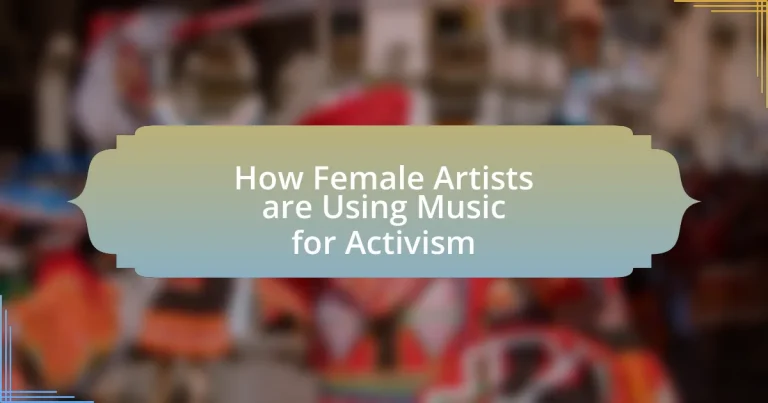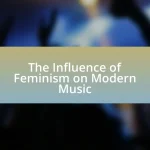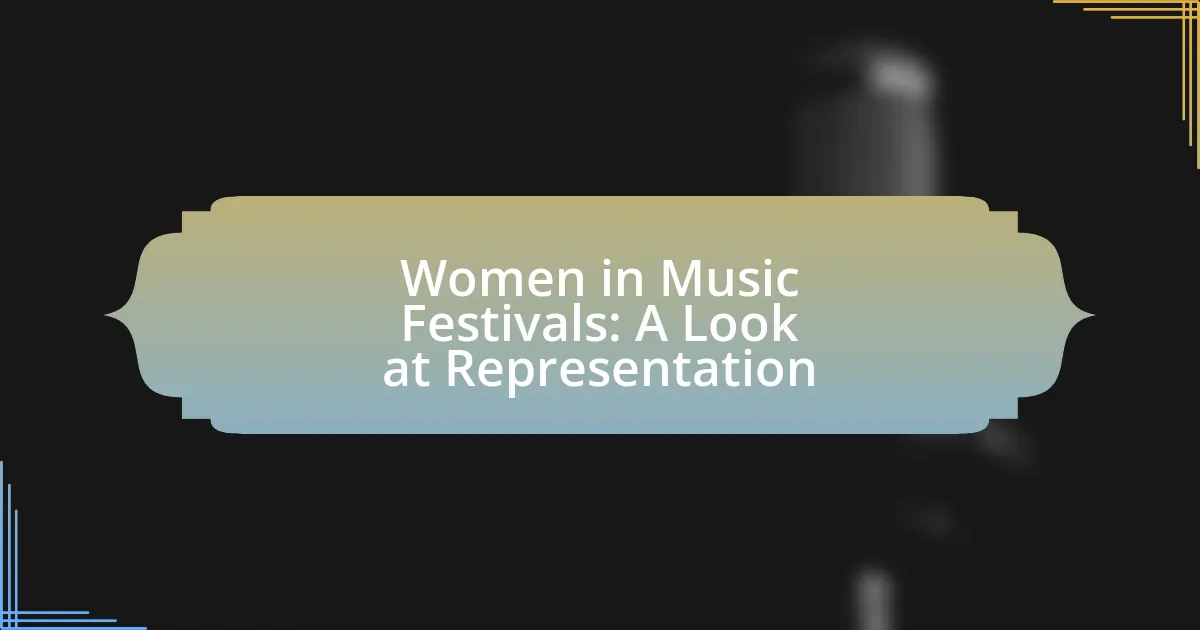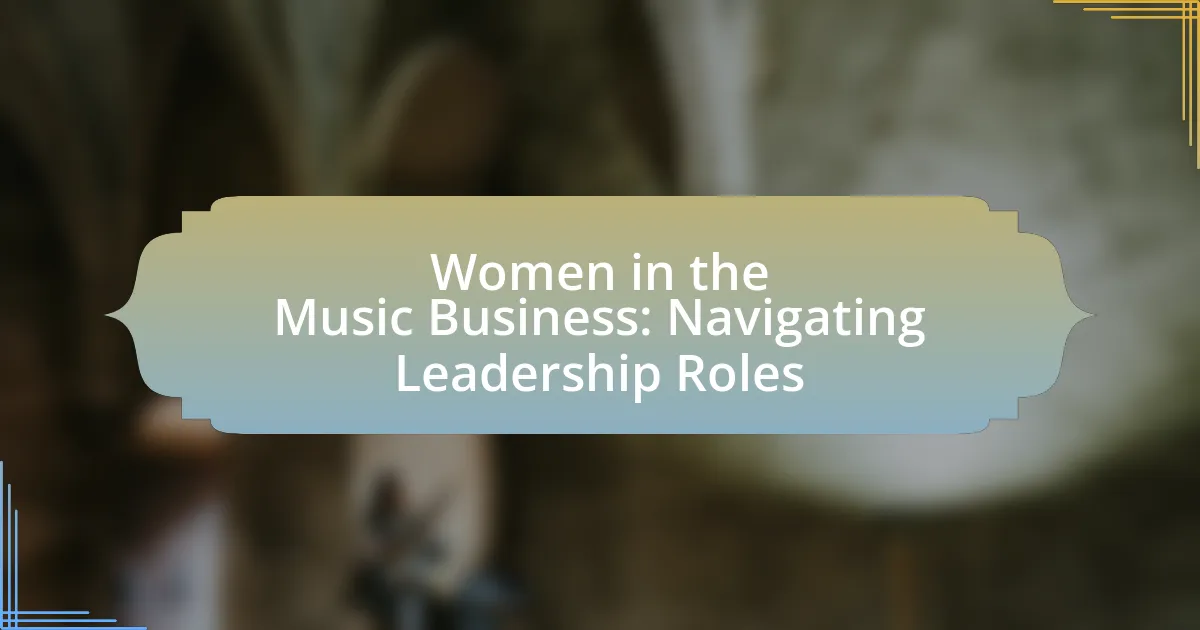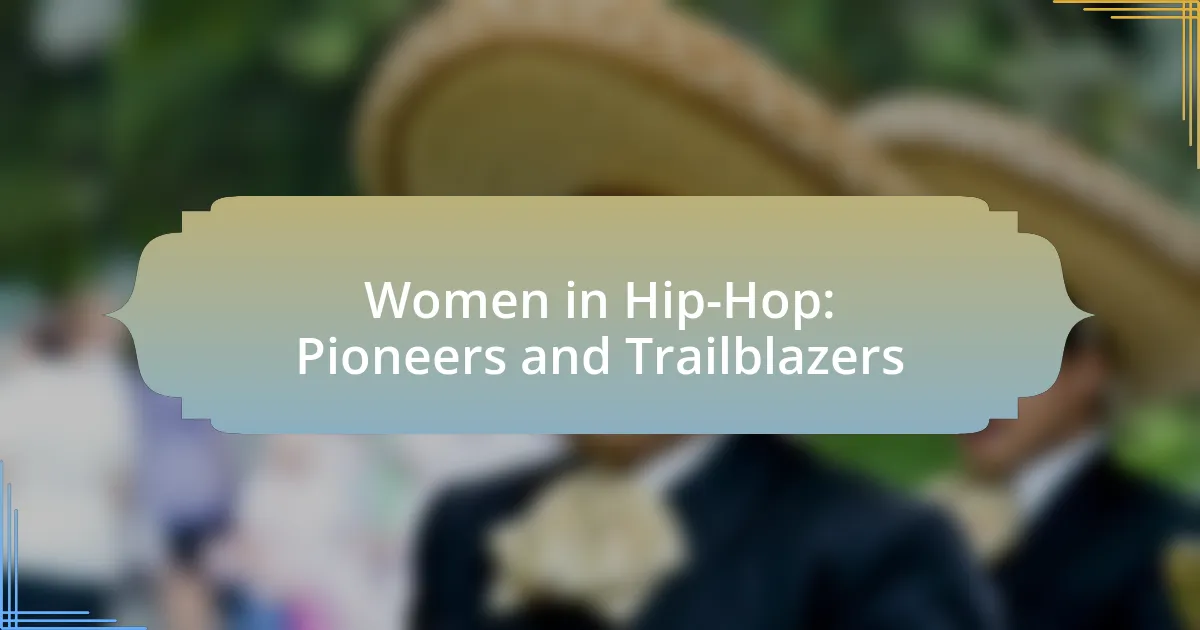Female artists are increasingly using music as a powerful tool for activism, addressing critical social issues such as gender equality, mental health, and racial justice through their lyrics and performances. Historical movements, including feminism and civil rights, have shaped their activism, with iconic artists paving the way for contemporary musicians to engage in social change. The article explores the themes female artists address, the impact of different music genres on their messages, and the strategies they employ to amplify their activism, including social media engagement and live performances. Additionally, it examines the challenges they face, such as gender bias and societal expectations, while highlighting the importance of community building and collaboration in their efforts to inspire change.
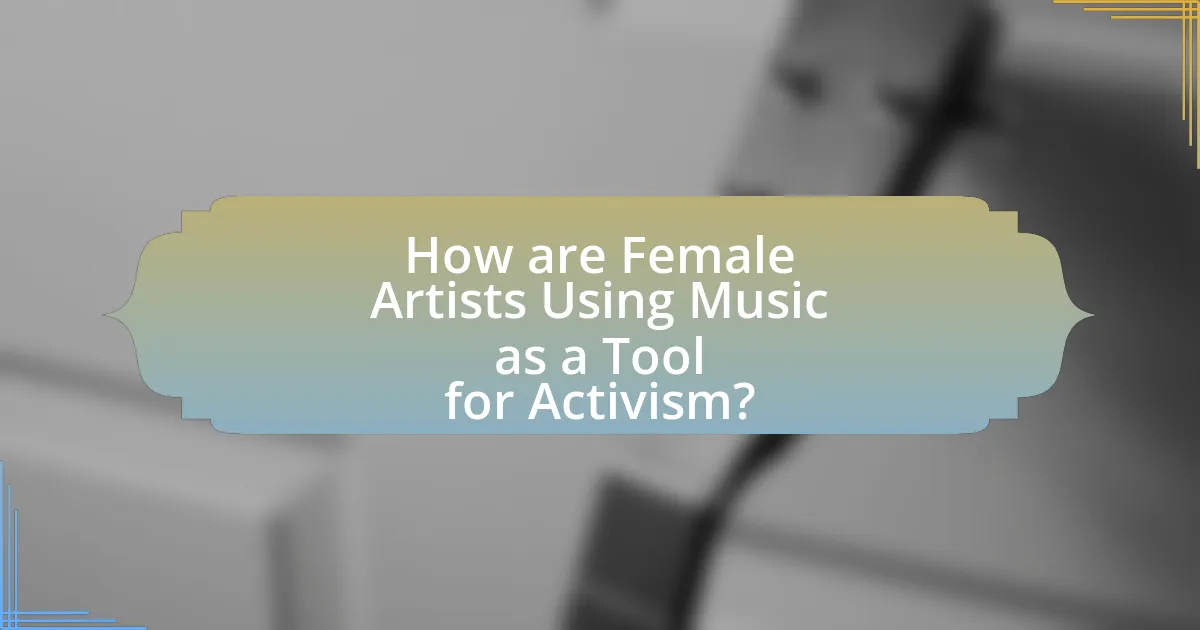
How are Female Artists Using Music as a Tool for Activism?
Female artists are using music as a tool for activism by addressing social issues, promoting awareness, and inspiring change through their lyrics and performances. For instance, artists like Billie Eilish and Halsey have tackled topics such as mental health, gun violence, and gender equality in their songs, effectively reaching a wide audience. Research indicates that music can influence public opinion and mobilize communities; for example, the “Me Too” movement gained significant traction partly due to songs and performances by female artists that highlighted sexual harassment and assault. This demonstrates that female musicians not only express their personal experiences but also serve as catalysts for broader societal conversations and actions.
What historical context has shaped female artists’ activism in music?
Female artists’ activism in music has been shaped by historical movements such as the women’s suffrage movement, civil rights movement, and feminist movements of the 1960s and 1970s. These movements provided a platform for women to express their struggles and advocate for social change through music. For instance, artists like Joan Baez and Nina Simone used their music to address issues of racial inequality and women’s rights, reflecting the socio-political climate of their times. The emergence of genres like punk and hip-hop further empowered female artists to challenge societal norms and assert their voices, leading to a legacy of activism that continues to influence contemporary musicians.
How have past movements influenced current female artists?
Past movements have significantly influenced current female artists by providing a framework for activism and expression in their music. The feminist movements of the 1960s and 1970s, for instance, empowered women to address social issues through art, leading to the emergence of genres like riot grrrl, which combined punk music with feminist themes. This historical context has shaped contemporary artists, such as Billie Eilish and Lizzo, who incorporate messages of body positivity and mental health awareness in their work, echoing the advocacy seen in earlier movements. Furthermore, the #MeToo movement has inspired artists to confront issues of sexual harassment and gender inequality in their lyrics, demonstrating a direct lineage from past activism to present artistic expression.
What role did iconic female artists play in paving the way for activism?
Iconic female artists have played a crucial role in paving the way for activism by using their platforms to address social issues and inspire change. For instance, artists like Joan Baez and Nina Simone used their music during the civil rights movement to raise awareness about racial injustice, while Madonna and Beyoncé have tackled issues such as gender equality and LGBTQ+ rights through their lyrics and public statements. Their influence extends beyond music; they have mobilized fans and communities, creating a cultural dialogue around activism. The impact of these artists is evident in the way they have shaped public discourse, as seen in the widespread participation in movements like #MeToo and Black Lives Matter, where their contributions have helped to amplify marginalized voices and foster solidarity.
What are the primary themes female artists address through their music?
Female artists primarily address themes of empowerment, identity, social justice, and personal experiences through their music. Empowerment is often conveyed through anthems that promote self-confidence and resilience, as seen in songs like Beyoncé’s “Run the World (Girls).” Identity themes explore gender, race, and sexuality, exemplified by artists like Lizzo, who celebrates body positivity and self-acceptance. Social justice is a significant focus, with artists such as Halsey and Janelle Monáe addressing issues like racial inequality and LGBTQ+ rights in their lyrics. Personal experiences, including love, heartbreak, and mental health, are also prevalent, as demonstrated by artists like Taylor Swift and Adele, who share their narratives to foster connection and understanding. These themes reflect the diverse ways female artists use their platforms to advocate for change and resonate with their audiences.
How do issues of gender equality manifest in their lyrics?
Issues of gender equality manifest in the lyrics of female artists through themes of empowerment, critique of societal norms, and calls for change. For example, artists like Beyoncé in “Flawless” emphasize self-acceptance and challenge traditional gender roles, while Taylor Swift’s “The Man” critiques the double standards women face in professional settings. These lyrics often highlight personal experiences and broader societal issues, making them relatable and impactful. The use of personal narratives and social commentary in their music serves to raise awareness and inspire action towards gender equality.
What social justice causes are commonly highlighted by female musicians?
Female musicians commonly highlight social justice causes such as gender equality, racial justice, LGBTQ+ rights, and mental health awareness. For instance, artists like Beyoncé advocate for gender equality through initiatives like the “Formation” movement, which emphasizes Black women’s empowerment. Similarly, Lady Gaga has been a vocal supporter of LGBTQ+ rights, particularly through her work with the Born This Way Foundation, which promotes mental health and acceptance. Additionally, musicians like Janelle Monáe address racial justice in their music and public statements, reflecting the ongoing struggles against systemic racism. These examples illustrate how female musicians leverage their platforms to raise awareness and drive change in critical social issues.
How do female artists utilize different music genres for activism?
Female artists utilize different music genres for activism by embedding social and political messages within their lyrics and performances. For instance, hip-hop artists like Nicki Minaj and Cardi B address issues such as gender inequality and police brutality, using their platforms to raise awareness and inspire action. Similarly, folk musicians like Joan Baez have historically used their music to advocate for civil rights and anti-war movements, demonstrating the genre’s capacity for storytelling and emotional resonance. Additionally, pop artists like Beyoncé incorporate themes of empowerment and racial justice in their work, as seen in her visual album “Lemonade,” which addresses systemic racism and personal identity. These examples illustrate how female artists leverage the unique characteristics of various genres to amplify their activist messages and engage diverse audiences.
What impact does genre have on the message and reach of their activism?
Genre significantly influences the message and reach of female artists’ activism by shaping the emotional tone and accessibility of their work. For instance, genres like pop and hip-hop often have broader appeal and can reach larger audiences due to their mainstream popularity, allowing artists to disseminate their messages widely. In contrast, genres such as folk or punk may convey more niche messages that resonate deeply with specific communities but may not achieve the same level of mass exposure. Research indicates that artists like Beyoncé and Billie Eilish, who utilize pop elements, have successfully addressed social issues like racial inequality and mental health, respectively, reaching millions through their chart-topping hits. This demonstrates that the choice of genre can either amplify or limit the effectiveness of an activist message, depending on its cultural resonance and audience engagement.
How do collaborations across genres enhance their activist messages?
Collaborations across genres enhance activist messages by combining diverse musical styles and audiences, thereby amplifying the reach and impact of the message. For instance, when a pop artist collaborates with a hip-hop artist, they merge fan bases, which can lead to increased awareness and engagement on social issues. This cross-genre collaboration often results in innovative sounds that attract listeners who may not typically engage with activist content, making the message more accessible. A notable example is the collaboration between artists like Beyoncé and Jack White, which not only showcased their unique styles but also addressed themes of social justice, thereby broadening the conversation and encouraging a wider audience to participate in activism.
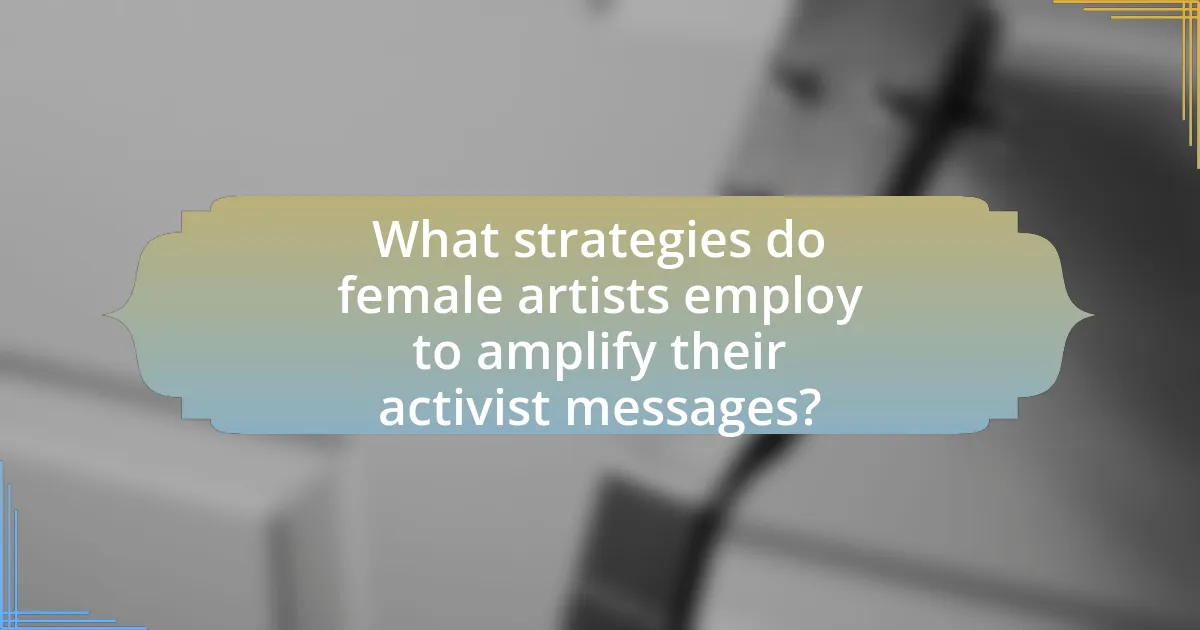
What strategies do female artists employ to amplify their activist messages?
Female artists employ various strategies to amplify their activist messages, including collaboration, social media engagement, and the use of powerful imagery in their performances. Collaboration with other artists and activists enhances visibility and creates a broader platform for their messages, as seen in projects like the “Women’s March” where musicians united to advocate for women’s rights. Social media serves as a vital tool for female artists to reach diverse audiences quickly, allowing them to share their messages widely and engage in real-time discussions, exemplified by artists like Billie Eilish who use platforms like Instagram to address social issues. Additionally, the incorporation of striking visuals and thematic elements in performances, such as Beyoncé’s use of cultural symbolism during her Coachella performance, reinforces their messages and resonates emotionally with audiences. These strategies collectively enhance the impact of their activism in the music industry and beyond.
How do social media platforms play a role in their activism?
Social media platforms serve as crucial tools for activism by enabling female artists to amplify their messages and connect with broader audiences. These platforms facilitate the rapid dissemination of information, allowing artists to share their music and related causes instantly, reaching millions globally. For instance, campaigns like #MeToo and #BlackLivesMatter gained momentum through social media, showcasing how artists leverage these platforms to raise awareness and mobilize support. Additionally, statistics indicate that 69% of adults in the U.S. use social media, highlighting its potential as a powerful medium for activism. By utilizing hashtags, live streams, and interactive content, female artists can engage their followers, foster community, and inspire action, thereby enhancing the impact of their activism.
What are the most effective ways female artists engage with their audience online?
Female artists effectively engage with their audience online through social media platforms, live streaming, and interactive content. Social media allows them to share personal stories, promote their music, and connect with fans in real-time, fostering a sense of community. For instance, artists like Billie Eilish and Lizzo utilize Instagram and TikTok to share behind-the-scenes content and engage in conversations about social issues, which resonates with their audience. Live streaming performances and Q&A sessions create an intimate atmosphere, enabling direct interaction and feedback. Additionally, interactive content such as polls, challenges, and fan collaborations enhances audience participation, making fans feel valued and involved in the artistic process. These strategies not only increase visibility but also strengthen the bond between female artists and their supporters, ultimately amplifying their activism messages.
How do viral campaigns contribute to their activism efforts?
Viral campaigns significantly enhance activism efforts by amplifying messages and mobilizing support rapidly across diverse audiences. These campaigns leverage social media platforms to create widespread awareness, enabling activists to reach millions in a short time frame. For instance, the #MeToo movement gained momentum through viral social media posts, leading to increased public discourse on sexual harassment and assault, which resulted in legislative changes and heightened accountability for perpetrators. This demonstrates that viral campaigns not only spread awareness but also catalyze tangible social and political change.
What role do live performances play in their activism?
Live performances serve as a powerful platform for female artists to amplify their activism by engaging audiences directly and fostering a sense of community. Through concerts and festivals, these artists address social issues, raise awareness, and inspire action, often incorporating messages related to gender equality, racial justice, and environmental concerns into their performances. For instance, artists like Beyoncé and Billie Eilish have used their live shows to advocate for movements such as Black Lives Matter and climate change awareness, effectively reaching thousands of fans in a single event. This direct engagement not only enhances the emotional impact of their messages but also mobilizes fans to participate in activism beyond the concert setting.
How do concerts and festivals serve as platforms for social change?
Concerts and festivals serve as platforms for social change by providing a large audience and a communal space for raising awareness about social issues. These events often feature performances that address topics such as gender equality, climate change, and racial justice, effectively using music as a medium for activism. For instance, the 2018 Women’s March on Washington included performances by artists like Janelle Monáe and Alicia Keys, who used their platforms to advocate for women’s rights and social justice. Additionally, festivals like Coachella have incorporated panels and discussions on social issues, further amplifying the message of change. This combination of entertainment and activism creates a powerful environment for mobilizing communities and inspiring action.
What are some notable performances that have made an impact?
Notable performances that have made an impact include Beyoncé’s Super Bowl halftime show in 2016, which highlighted Black Lives Matter and police brutality, and Lady Gaga’s performance at the 2016 Oscars, where she addressed sexual assault and supported survivors. These performances resonated widely, drawing attention to critical social issues and sparking conversations around activism in music. Beyoncé’s show was particularly significant as it featured a tribute to the Black Panthers, while Lady Gaga’s performance included survivors of sexual assault on stage, emphasizing solidarity and awareness.
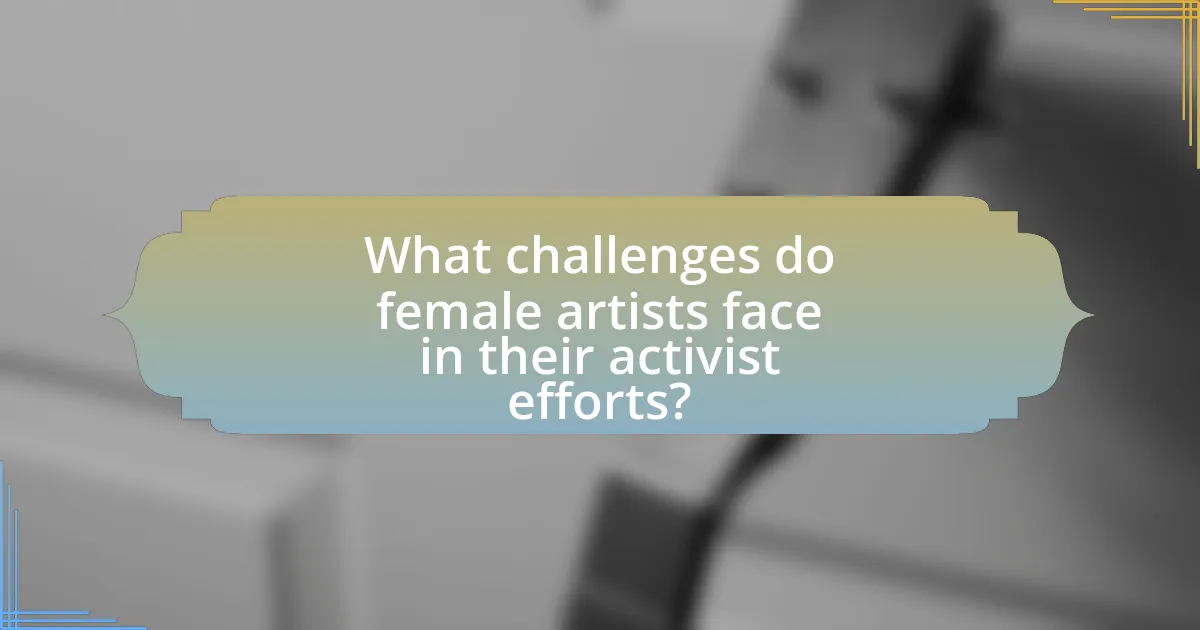
What challenges do female artists face in their activist efforts?
Female artists face significant challenges in their activist efforts, including gender bias, lack of representation, and limited access to funding and platforms. Gender bias manifests in the form of stereotypes that undermine their credibility and authority, often leading to their work being dismissed or undervalued compared to their male counterparts. According to a report by the Annenberg Inclusion Initiative, women make up only 22.4% of artists in popular music, highlighting the lack of representation that female artists encounter. Additionally, female artists often struggle to secure funding for their projects, as studies show that women-led initiatives receive less financial support than those led by men. These barriers hinder their ability to amplify their messages and create impactful change through their music.
How does the music industry impact their ability to advocate for change?
The music industry significantly enhances the ability of female artists to advocate for change by providing a platform that amplifies their voices and messages. This platform allows artists to reach large audiences, thereby increasing awareness of social issues. For instance, artists like Beyoncé and Taylor Swift have used their visibility to address topics such as racial inequality and LGBTQ+ rights, respectively, effectively mobilizing fans and influencing public discourse. Additionally, the industry’s support through collaborations, sponsorships, and media coverage further legitimizes their activism, as seen in events like the Women’s March where musicians played pivotal roles in promoting the cause.
What barriers do female artists encounter in promoting their messages?
Female artists encounter significant barriers in promoting their messages, primarily due to systemic gender inequality and lack of representation in the music industry. Research indicates that women are often underrepresented in key decision-making roles, which limits their access to platforms that amplify their voices. For instance, a study by the Annenberg Inclusion Initiative found that only 22.4% of artists on the Billboard Hot 100 between 2012 and 2019 were women, highlighting the disparity in visibility. Additionally, female artists frequently face challenges such as sexism, harassment, and stereotypes that undermine their credibility and authority in their artistic expressions. These barriers hinder their ability to effectively communicate their messages and engage with broader audiences.
How do societal expectations affect their activism?
Societal expectations significantly shape the activism of female artists by influencing the themes they address and the methods they employ. These artists often navigate traditional gender roles and societal norms, which can either empower or constrain their activism. For instance, female musicians may feel pressured to conform to expectations of femininity, leading them to adopt more subtle or indirect forms of activism in their music. Research indicates that female artists frequently use their platforms to challenge stereotypes and advocate for social change, as seen in the works of artists like Beyoncé and Taylor Swift, who address issues such as gender equality and LGBTQ+ rights in their lyrics and public statements. This interplay between societal expectations and activism highlights the complex dynamics that female artists must manage in their efforts to promote social justice through music.
What backlash or criticism do female artists face for their activism?
Female artists face significant backlash and criticism for their activism, often manifesting as public scrutiny, social media harassment, and professional repercussions. This backlash frequently stems from societal expectations that discourage women from voicing political opinions or challenging the status quo. For instance, female artists like Taylor Swift and Beyoncé have faced criticism for their political statements, with detractors questioning their credibility and motives. Additionally, studies indicate that women in the music industry are often held to higher standards than their male counterparts, leading to a disproportionate amount of negative feedback when they engage in activism. This dynamic highlights the ongoing challenges female artists encounter as they navigate their roles as both entertainers and advocates for social change.
How do they respond to negative feedback or opposition?
Female artists respond to negative feedback or opposition by using it as a catalyst for empowerment and resilience in their activism. They often address criticism directly in their music, transforming negative experiences into powerful messages that resonate with their audience. For instance, artists like Taylor Swift and Beyoncé have publicly confronted backlash through their lyrics and public statements, reinforcing their commitment to social issues. This approach not only validates their experiences but also inspires listeners to engage with activism, demonstrating that adversity can fuel positive change.
What strategies do they use to maintain their focus on activism despite challenges?
Female artists maintain their focus on activism despite challenges by leveraging their platforms for awareness, building supportive networks, and utilizing their art as a form of expression and resistance. They often engage in social media campaigns to amplify their messages, collaborate with other activists to strengthen their impact, and create music that addresses social issues directly, thereby fostering a sense of community and purpose. For instance, artists like Billie Eilish and Halsey have used their music and public appearances to advocate for mental health awareness and social justice, demonstrating the effectiveness of combining artistry with activism.
What can aspiring female artists learn from those who use music for activism?
Aspiring female artists can learn the importance of using their platform to address social issues from those who use music for activism. Artists like Billie Eilish and Janelle Monáe have effectively utilized their music to raise awareness about mental health and racial equality, respectively. By integrating personal experiences and societal challenges into their work, these artists demonstrate that authenticity resonates with audiences, fostering a deeper connection and inspiring change. Furthermore, studies show that music with a social message can lead to increased engagement and mobilization among listeners, highlighting the potential impact of their art on societal issues.
What best practices can they adopt to effectively convey their messages?
Female artists can effectively convey their messages by utilizing clear and relatable lyrics, engaging visuals, and authentic storytelling. Clear and relatable lyrics ensure that the audience understands the message, as seen in songs like “Fight Song” by Rachel Platten, which resonates with empowerment themes. Engaging visuals, such as music videos that depict social issues, enhance the emotional impact; for example, Beyoncé’s “Formation” addresses racial identity and police brutality through powerful imagery. Authentic storytelling allows artists to connect personally with their audience, as demonstrated by artists like Janelle Monáe, who shares her experiences and perspectives on social justice. These practices not only amplify their messages but also foster a deeper connection with listeners, making the activism more impactful.
How can they build a supportive community around their activism?
Female artists can build a supportive community around their activism by leveraging social media platforms to connect with like-minded individuals and organizations. By sharing their experiences, music, and messages, they can foster engagement and collaboration. For instance, artists like Billie Eilish and Halsey have utilized platforms like Instagram and Twitter to mobilize their fan bases for social causes, creating a sense of community among their followers. Research indicates that social media can enhance community building by facilitating communication and providing a space for collective action, as seen in studies on digital activism.
